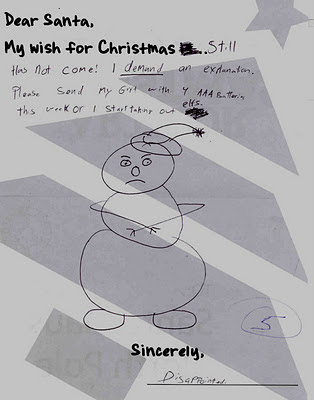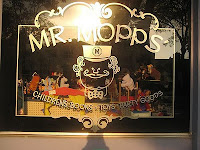
"Dear Santa, It's 7:37 on November 27th, 2011. I know it's early, but I don't think anyone will give me a Radica Password Journal. Please send me one in your jolly ol' ho-ho-ho spirit. Merry Christmas, Tai-Ge. P.S. Be jolly!" (Oakland)
"Dear Santa, I am sorry for the times I was bad, and that was a few times. I am sorry about my bad grades in science and history. Can I please have some presents anyway? Love, Heenapreet." (Fairfield)
"Dear Santa, My wish for Christmas still has not come. I demand an explanation! Please send my gift with four AAA batteries this week or I start taking out elfs! Sincerely, Disappointed." (San Jose)
Once upon a time, letters like these ended up in the post office's equivalent of Siberia instead of the North Pole.
But 25 years ago, Elma Ramiriez, Manager of Consumer Affairs for the Bay Valley Postal District, which stretches from Carmel to Napa, happened upon a pile of letters that were about to be thrown out, and they broke her heart.
"They were so touching, we just couldn't bring ourselves to throw them in the dead letter file," she said. "We thought, 'Somebody ought to answer them!'"
That first year, she and her co-workers answered as many as they could. But as word got around, other postmasters throughout Northern California started sending her their Santa letters, and it was clear she was going to need help.
So she turned to us, the public. And it's been a beloved Bay Area holiday tradition ever since
Ramirez retired last spring. But her successor, MaryGrace Cruz, is keeping up the good work.
Currently, she and and her fellow elves - Janet Ezell, Toni Harmon, David Thompson, Brenda Presley, Timothy Wong, Ferdinand Sutanto, Margarita Cristobal and Carmen Boueche and Nina Bopharat Tan - are sorting through piles of incoming letters and putting them in two huge boxes: one labeled "Needy," the other labeled "Greedy."
Every year, the public is invited to read as many as they like and answer them. (See the sidebar for details on how to participate.) And every year, we print the Neediest and Greediest.
So what are our children thinking? Let's ask them:
"Dear Santa, You are awesome! Hooray for Santa! I'm thankful for you because you make Christmas speshul! Happy Christmas, Santa! From Maya." (Oakland)
"Dear Santa, I want you to know that I am going to leave you a treasure in my room in return for the Christmas gifts. Shhhhhhhhhhh! You can't know what it is, and I promise you're going to love it! Bye! Jaeden." (Antioch)
"Dear Santa, I hope you and your family are OK. I hope you will bring something for my two sisters this Christmas because my mom does not have a job. My dad works part time only. I'm 9 years old and I need warm clothes. Shoes size 2. My 14-year-old sister, she's size L. My 18-months-old baby sister needs warm clothes and baby toys. Sincerely, Cristian." (Oakland)
"Dear Santa, I would like a glass angel because they are pretty and sparkly. I will be respectful and responsible. I promise. P.S. I'll have real good cookies for you. Love, Colm (written by mom)." (Berkeley)
"Dear Santa, My favorite holiday is Christmas! I mostly enjoy having my cousins over, I don't care if I do not get the presents I asked for. Just do your best. Thank you, Xavier." (Moraga)
"Dear Santa, Why do you have help from the elves? I hope I can see you on a sled. Do you like cookies and milk? I hope you bring me something to enjoy. Love, Emma." (San Jose)
"Dear Santa, I'm so happy I am saying a hello to you. I'm also happy that you exist because that's how you can help us. This year our mom can't give us nothing because she lost her job and you're the only hope I have. I would love some boots because the ones I have are ripped and I can't keep them together with glue any more. If you can I will be so grateful. And if not, I'll still be happy for just saying a hello to you. Sincerely, Ingrid." (Oakland)
"Dear Santa, I really like Harry Potter and Twilight. So could you get me lots of Twilight and HP stuff please? I believe in you! From Madison." (Pleasanton)
"Dear Santa, I wish for my mother's and father's healthyness. I also wish for clothes and shoes. If my wishes come true, I would be so happy. Sincerely, Sokhun." (Hayward)
"Dear Santa, Hello. I get good grades, not the best but I get Bs. I have always wanted an iPod Touch, but I couldn't get one because of the immigration status my parents are in. I hope to get this because I have always wanted one. Please and thank you, Sincerely, Diego." (Oakland)
"Dear Santa, I want a dog for Christmas. I will tell you the other things later. Love, Julius." (El Cerrito)
"Dear Santa, I am 5 years old. I haven't learned to write yet so I'm having someone help me write this letter. I am a very good girl. I love all my family. There's not much for me to say because I am only 5. Merry Christmas, Aytza." (Oakland)
"Dear Santa, Me and Esher are SO into vampires! And I have a question for you. Am I a real vampire? What am I missing? Please send a letter back. Your BEST friend, Amelia." (Albany)
"Dear Santa, I have been really good! I've been doing all my homework! Hope you are good, too. Until next time, Mila." (San Jose)
"Dear Santa, Will you bring me an airplane toy please? Because I like planes. I'd like you to sit in a chair and my house and eat cookies. Thank you, Santa. Love, Mickey." (Berkeley)
"Dear Santa, I'm 8 years old. I love you, Santa. Love, Jatijah." (Castro Valley)
"Gavin's and Bryan's Gift List: 1. Pure Fun 14-foot enclosure for trampoline. 2. Power wheels Fischer-Price Cadillac Hybrid Escalade-grey. Please! Please! Please!" (Oakland)
"Dear Santa, I want a jump rope and a Rapunzel doll and I love you, Santa. Love, Maegan." (Union City)
"Dear Santa Claus, Hi! My name is Maija. (Yeah, I know it's a whimsical and unique name, LOL.) I would like a Visa gift card. That way, I can buy things on the Internet without asking my parents. Thank you, Maija." (Richmond)
"Warning: Please do not read if not Santa!" (So, of course, we didn't read it.)
And finally, a letter from a desperate mom:
"Dear Santa, I have a six year old daughter who has had a very hard year. She and I had to leave our house in May due to domestic violence. We only took a bag of clothes and had to leave everything else. My daughter lost everything - her home, her toys, her stuff, her friends. She told me she'd like to have a bike like the one she had to leave behind. She is a really good girl and deserves to have a good Christmas. If you can help her, I would appreciate it more than you know. Thank you, Melanie." (Oakland)
SIDEBAR
How You Can Help
You, too, can make the holidays a little brighter for a needy child. Just visit Santa's Mail Room at the downtown Oakland Post Office, 201 13th Street (corner of 13th & Alice), Room 222, between 9 a.m. and 3 p.m. from now until Dec. 21, and the friendly elves will give you as many letters as you want.
"You don't necessarily have to send a present," says chief elf MaryGrace Cruz. "Often a kind word is enough. These kids are just glad to know that someone cares."
But, of course, if you're also moved to enclose a gift, nobody's going to stop you.
And if you'd like your own child to receive a letter from Santa, that can be arranged, too. Just write a letter to your child and put it in a stamped envelope addressed to your child.
Then stick the envelope inside another one addressed to North Pole Holiday Postmark, Postmaster, 4141 Postmark Dr, Anchorage, AK 99530-9998. (Yes, Santa has his own zip code.)
A special unit at the Anchorage Post Office will stamp your child's letter with a cancellation reading "North Pole" and mail it back.
Merry Christmas!




































